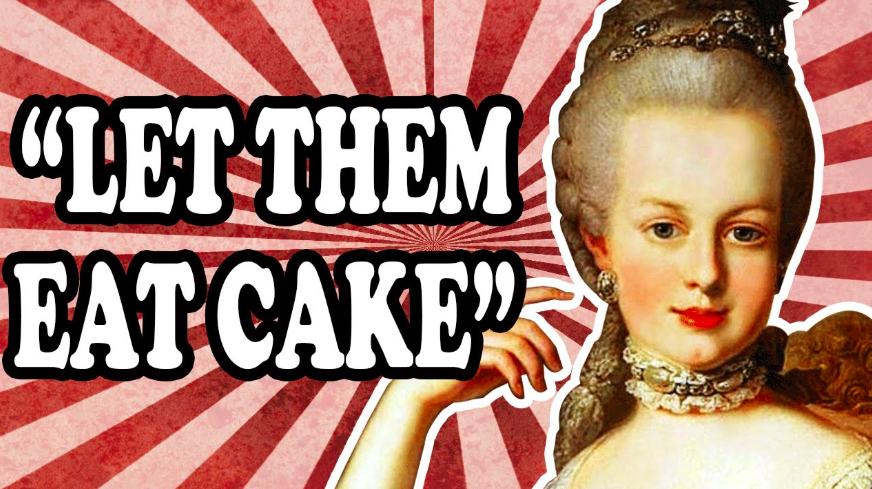June 16, 2018
Let Them Bake Cake, But Not Practise Law

It’s doubtful whether Marie Antoinette ever said “Let them eat cake”, but her Francophone counterparts in Canada have truly declared “They cannot practice law.”
This week, while religious freedom advocates are all eating cake to celebrate the Supreme Court in the USA deciding for Masterpiece Cake shop baker, Jack Phillips, the real future for freedom of association and liberty of conscience is being played out north across the border in Canada for a Christian tertiary institution that wished to open a law school.
The Supreme Court of Canada has just ruled that Trinity Western University, is not permitted to do so because of its stated beliefs and its required practices on traditional marriage.
You can read more about that here.
The basic gist is that TWU, a private university:
requires students to sign a “Community Covenant” that they while they attend the university they will respect the school’s religious teachings, including the requirement that sexual relations are only for the traditional marriage relationship of one man and one woman. This the law societies of British Columbia and Ontario say is discriminatory and they refused to accredit TWU’s law school proposal on that basis. The Supreme Court of Canada has now decided that the law societies were right.
What is most interesting is the judgement of the court at the end of this paragraph:
The majority [of the court] held that where religious practice impacts others then that must be considered. In this case the effect of the Covenant restricts the LGBTQ people who feel they have no choice but to attend TWU’s law school. They would have to deny who they are for three years while in school. “Being required by someone else’s religious beliefs to behave contrary to one’s sexual identity is degrading and disrespectful.”
Two things. First, up to this stage, no openly LGBTQ people have ever applied to attend TWU’s law school, nor is it likely that its law school would be their only choice of a law school.
But secondly, and more significantly, “they would have to deny who they are!” And in our age of extreme authenticity that is the worst sin possible. Denying who you are is inextricably tied to your sexual preferences. That’s the bottom line. Can anyone even begin to decide how a Supreme Court determine that who we are sexually is the baseline of who we are? And what about that last line!
“Being required by someone else’s religious beliefs to behave contrary to one’s sexual identity is degrading and disrespectful.”
In other words the court has made a value judgement about whose expression of authenticity is more important – who is protected from denying who they are and who is not protected; the LGBTQ community or the religious community.
And it was a no brainer. Those within the religious community will just have to deny who they are in order to accommodate the new Sexularism’s concern that no one deny who they are sexually. (Well that’s not quite true, there are still a few sexual boundaries and taboos left to cross, but given enough time…)
The fitness, or otherwise of TWU students to practice law is therefore inextricably tied to their religious beliefs and not their ability or failure to meet the minimum standards of the nation’s law societies , as noted by the court’s minority decision.
Astonishing when you think about it. A prospective law student has a vast array of choices as to which college to attend, but if they, being openly gay, choose to attend an institution which has been established as an alternate ethically community, then the law now states that that community has to change to accommodate them, primarily because its views are degrading and disrespectful. And if it does not, then it is effectively disbarring any law students who graduate from its halls.
You can kiss freedom of association goodbye at that point.
We need to grasp what this judgement means, especially if we assume, as I do – or at least have done -, that a Benedict Option approach to creating new institutions is the way forward for Christians as hard secularism pushes ahead with its sexuality agenda.
This Canadian judgement has this primary implication: We can create all of the new institutions we like; form all of the ethical communities we wish; establish new training centres for professionals to our hearts content, but none of this will be of any use should the state, or peak professional bodies, choose to deregister them or refuse to recognise the qualifications gained in those institutions.
And that’s exactly what has happened in the TWU case. The state has refused to protect alternate ethical communities, setting up a precedent for all educational institutions to be forced out of business, should they fail to sign up.
The Canadian Court was nowhere as squeamish as SCOTUS, which ruled in favour of Phillips because of the undue harshness of language in the Colorado Civil Rights Commission’s original ruling against him, not because of the issue itself. Despite religious freedom advocates labelling it a win. it’s nothing of the sort. The Canadian decision is more likely where the future lies.
The Benedict Option is only an option if the state permits, in a truly pluralist setting, alternate ethical communities to not only train students who covenant to live within their ethical framework, but then to recognise those students as having attained the necessary qualifications to serve and lead and operate within secular professional bodies and government agencies.
Simply put, TWU can provide all of the legal training – or any other vocational, professional or industry training it likes, to its students, but the Court has ruled that Canada’s national peak bodies can refuse to recognise those qualifications, purely on the basis of their religious convictions and practices.
Of course you can always attend a strictly secular university. But the issue is not going away. I have already spoken to a well regarded surgeon who is under pressure to sign off on statements that he does not in good conscience agree with in order to continue practising.
In The Benedict Option, Rod Dreher posits the possibility that despite the new institutions Christians may build, the state could well play a counter game – a chess match which only has “check mate” as a solution.
The Benedict Option is built upon the hope that the state will allow freedom – albeit begrudgingly – to alternate ethical communities, and ensure they can take a place at the public table.
But Dreher also concedes that this may not happen. Many careers will no longer be open to Christians who hold orthodox Christian convictions on sexuality, and many of those will be in public service, health, and educational settings; primary places that Christians have found opportunities to serve alongside others in the goal of human flourishing.
How might the religious freedoms issue play out in Australia? Most likely more like Canada than the USA.
How confident should we be that it will be any different here? Well, when Shadow Attorney General, Mark Dreyfus, was told about this well documented TWU case in a public forum in 2016, he declared he had never heard of it. Well he will have heard of it now, or he will hear of it soon. Let’s see if he’s got a better understanding of liberty of conscience and freedom of association than his Canadian legal counterparts.
Written by
There is no guarantee that Jesus will return in our desired timeframe. Yet we have no reason to be anxious, because even if the timeframe is not guaranteed, the outcome is! We don’t have to waste energy being anxious; we can put it to better use.
Stephen McAlpine – futureproof
Stay in the know
Receive content updates, new blog articles and upcoming events all to your inbox.


